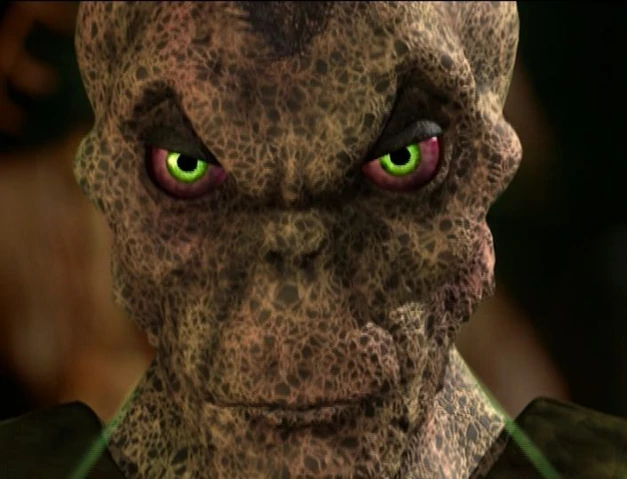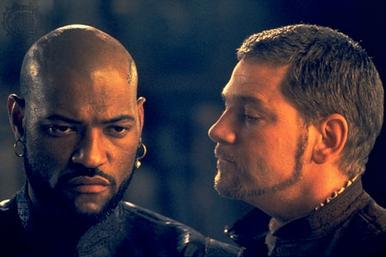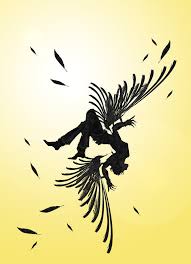I have enjoyed reading Shakespeare since I was a child. In high school, I nerdily carried around a notebook covered in his quotes from
Macbeth and volunteered to do the "To be or not to be" speech for a class. Yet, I have never quite forgiven him for writing
Othello. From the first time I saw it, it has made a cold chill run down my spine. When I have thought of it, a nameless terror has seized me. Even when I saw it being acted out on "Cheers,"
I could not get past the feeling of horror that gripped me even though it was supposed to be funny. I have heard many discussions about the how one is supposed to feel ambiguously about Othello, to be at once empathetic and repulsed, but I have never been captivated by his captivation with Iago or his descent to madness. I have read many scholars discussing the idea that everyone has a jealous killer in them, and it is in facing that part of us that we begin to understand and empathize with Othello.
 |
| Jealousy, the green-eyed monster |
As a woman who has suffered abuse, I can only sit with my mouth open at this tragedy. I understand that for thousands of years men have considered women as chattel and possessions that they could dispose of as they liked. I know that there are still men today who consider their wives as chattel and property and not human beings. I consider that Othello is one of that ilk. His color does not matter to me. To me, he is like most men physically. Most men are capable of overpowering the women they marry. It is understood that most women are physically weaker than their partners. That is where trust comes in and that is what is being betrayed so thoroughly in this story and why it creeps me out so.

Every time anywhere a woman lies down with a man, she is trusting him. It is an implicit thing that is not said and that a lot of men ignore or think a ridiculous old-fashioned idea, but it is the truth. A female must trust a male to have sex with him; whether she should is another idea all together. But when the big man lies on top of his wife in their bed and strangles her, it is done in a parody of the marriage agreement. Instead of the position giving joy and pleasure, it is mimicked to perpetuate murder. It is used to betray. Perhaps that is the idea of the duality of the bedroom and relationships between men and women. It is that betrayal of that unsaid and implicit trust that is so disturbing and makes a woman feel so vulnerable and a man feel so monstrous when seeing
Othello.
I have also never quite bought the idea that Othello killed Desdemona because he was jealous. Yes, jealousy can drive men mad, and people have shot each other for cheating, but Othello had only the word of Iago that his wife was unfaithful. He believed the idea so quickly, yet his wife had hardly been out of his sight, so why believe it so soon? It had to be more than jealousy, so then what? What was the fulcrum that moved Othello. I came across an article
, "'Yet That's Not Much': Age Differences in Othello" that besides discussing race and gender says one should look at age in the play too. So let us look. We have a May-December romance here. Othello is as old as his wife's father. By that time, there many comedies about May-December romances. They were seen as unseemly and ridiculous. Shakespeare discussed the idea of a young girl being married to an older suitor in
Romeo and Juliet. We all know how foolish Paris was. Now, put twenty more years on him.

We have an older man with a hot young girl, but they did not have Viagra in those days. So, would Othello be having doubts about satisfying his young, frisky girl? Would he be feeling insecure about his prowess with her? And speaking of insecure, we know he was not of high status birth that he worked himself up the ranks. He had just settled into a good social position and now has a wife fitting of it. Othello is in a good place unless you consider how humiliating it would be if his young wife cheated on him. Othello is a triple loser if she is unfaithful. He is a foolish old goat cuckold who loses face in public and is his humiliated socially by her betrayal. Maybe a man who was younger, of good family and wealthy could stand that, but someone from the streets like Othello, where one's status is so hard won, could not take this blow. He has gambled his status on this girl, and he thinks he has lost.
Now, everyone says that Iago knows Othello so well he can push all his buttons, but nobody asks how a Venetian guy could understand Othello, a Moor? They are from two totally different cultures or are they? They are both men at the bottom of the social ladder trying to climb up. Only Othello has climbed past Iago and left him in the dirt though he is a foreigner. We all know how some people hate to see anyone that is different doing better than them. They think that what that person accomplished should be theirs. Iago seems no different. Iago knows Othello because they are the same guy, both social climbers with the same ambitions and the same insecurities.

Iago's wife says that she has cheated on her husband but only because he has taught her how. Here is another similarity. Iago knows what it is to be a cuckold, who knows jealousy, and it is that knowledge that he uses against Othello. Everyone has two forces in them, the one that pulls us up and into the light, which would be embodied by Desdemona in this case, and the force that represents the worst in us or our fears that pull us down, our Iago. Othello listens to Iago because he is the personification of his inner Shadow.
Othello is a play about the destiny of a man's soul caught between heaven and hell. Desdemona can forgive Othello's unforgivable betrayal because she is not a woman like Iago's wife (who cheats on him ouu of revenge) but an ideal. She is young love, innocent, sweet and unfaltering, made flesh.
It has been because of this that for may years I have found it hard not to hate Othello and to call him unworthy and less of a human being. Desdemona had to defy forces like Iago, social condemnation, her father's displeasure, racist assumptions and cultural constructs and expectations, and she surmounted them. She did into listen when she was told not to marry such an "old black goat." She rose above it all. Othello's love was never tested until Iago came along, and he fails utterly. Is this the difference between young love and old love? Young love is unfaltering while old love is flawed and cynical and suspicious?
Life must have taught Othello not to trust love, and this is where I can empathize with him finally. We all have our fears that love is fleeting, that we cannot hold it, that it is not true. When we fight to get something we always wonder was it worth it? Is the price I paid fair or was I cheated? Can my happiness be real? Can I deserve this? Othello got his happiness, but he could not keep it because he could not trust it. Maybe he had a tragic life, which he implies when he speaks of himself, or perhaps he had many losses that taught him not to trust happiness. Many of us, including me, have out of fear, sabotaged our own happiness with worry and distrust. People who have had hard lives don't trust joy. They know it is fleeting, and sometimes they destroy it only because they believe it will not last. Perhaps there is the idea that if we destroy it, then at least we control its destruction, at least it is not taken from us. We will get rid of our happiness ourselves and pretend we have control.

Othello is an Icarus who tears apart his own wings because he believes he will fall anyway. He listens to Iago, because as a mature man he knows that happiness does not always last. Once again we come back to the idea of trust and faith. It is his lack of it that destroys him in the end as it destroys many of us.
I have hated Othello, feared him, seen him as the worst of men, but in reality he is just like all of us: afraid of our own happiness and willing to self-sabotage to make our own sad worldview true. Othello is not a Moor or a black man; he is not an old man or a young man or any man of any type. He is just us all at our darkest and saddest, when we have lost faith in hope, trust and goodness, and that is the real tragedy of the play.


















